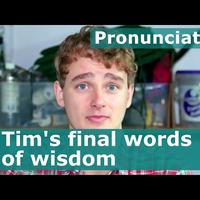26- Tim's final words of wisdom
Hi. I'm Tim and this is my Pronunciation workshop. Here I'm going to show you how English is
really spoken. Come on, let's go inside.
Well, here we are in the pronunciation workshop
for the final time. Today, let's look back on what we've covered during this series and I'll
offer some final tips and words of advice. When we write English, each word is separate;
there are spaces between the words. But, that's not how we speak English. If. We. Did. It.
Might. Be. Easier. To. Understand. But. We. Would. Sound. Like. Robots. No. When we speak
English, although there are some pauses, we mostly bump the words together. And when these
words bump into each other certain things can happen that affect the sounds. We've learned
how /t/ and /d/ sounds disappear between consonants:
'Mashed potato' becomes /mæʃpəˈteɪtəʊ/.
Consonant sounds can link with vowel sounds:
'An egg' becomes 'anegg'.
Certain vowel sounds can link with certain other vowel sounds by adding sounds:
'The shoe is…' becomes 'the shoe /w/ is…'
Two consonant sounds can join together, or twin.
'It takes two' becomes /ɪt:eɪks tuː/.
Some sounds can change completely:
'Green Park' /griːn pɑːk/ becomes /griːmpɑːk/.
Unstressed grammar words are often weak:
'I'd have been late' becomes /aɪdəv bɪn leɪt/
And we've also seen how a little sound, schwa, is important to the rhythm of natural spoken
English.
'A piece of cake' /ə piːsə keɪk/
These are all features of what we call connected speech. Natural speech is full of these features.
And for native speakers, these changes happen automatically. The more you can get used to
listening to and speaking English, the more naturally they'll come to you too. But my
advice is that the most important thing to pay attention to is schwa. Getting schwa in
the right place is the first step to getting English pronunciation right. And that, for
the last time, is about it from the pronunciation workshop. And always remember that if you
want to learn more about pronunciation or other aspects of English, then please visit
our website, bbclearningenglish.com. Thank you so much for watching this series and I'll
see you soon. Bye bye!
Erm, hello? Hello? Erm. I can't get out. What do I do? Help!
Help! Oh. Somebody?

